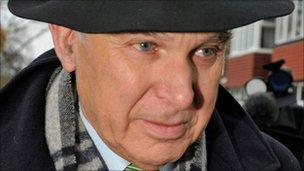Does Telegraph sting menace MPs' link to constituents?
- Published

Vince Cable says "great damage has been done" by the Telegraph's tactics
The link between MPs and their constituents is one of the most highly prized aspects of British democracy.
Even the most senior government ministers hold regular constituency surgeries where they come face-to-face with the people they represent.
It is seen as a way of keeping MPs in touch with the concerns of those whom they insist on calling "ordinary voters".
In most cases, constituents can simply turn up at the advertised time and queue up for a chat with their elected representative.
But has the bond of trust on which the system depends been undermined by the Daily Telegraph's sting operation against Lib Dem ministers?
Business Secretary Vince Cable, the most prominent victim of the Telegraph's undercover reporting, told his local newspaper: "I feel quite angry and strongly about this. I've had constituency surgeries now for 13 years every week; that's well over 600.
"Thousands and thousands of constituents have been to see me, often on very difficult and highly confidential issues which have been respected by me and by them.
"Then somebody who isn't a constituent falsifies their name and address and comes in with a hidden microphone - it completely undermines the whole basis on which you operate as a local MP.
"All my colleagues, of all parties, feel very strongly that some great damage has been done by this."
'Attractive'
The Telegraph sent two reporters to a string of constituency surgeries, posing as young mothers with benefit problems.
They taped hours of conversations with the ministers, many of which the 大象传媒 understands have yet to be published, detailing their concerns about government policy, some unkind remarks about Tory coalition colleagues and boasts about the power they now wield.
Some have argued that the ministers in question should not have been so naive and foolish as to unburden themselves to complete strangers.
Surely they must have realised something was going on when the "constituents" moved seamlessly from talking about problems with their benefits to very pointed questions about political strategy?
There have also been suggestions that the ministers, who are all middle-aged men, were showing off to the two young female reporters - falling for one of the oldest tricks in the undercover journalists' trade, in other words.
One of the MPs caught up in the sting told 大象传媒 News the two reporters were "really quite attractive".
But he also said that they had come up with convincing background stories and had asked detailed, and convincing, questions about benefits.
Care Minister Paul Burstow, who urged the undercover reporters not to trust David Cameron, said he was "embarrassed" by the revelations.
"I think the lesson I have learned is that when people come to see me in surgeries I should check their addresses, because the two people who came to my surgery gave me false addresses and obviously pursued a line of conversation for over 15 minutes in which this was the remark I made. I regret it. I do trust the prime minister."
He said the Telegraph should examine its ethics - and claimed MPs would now "constantly think they are being interviewed by members of the Telegraph when they are conducting their surgery appointments" which was a "great shame".
"I think constituents deserve candour. That's what these two ladies had from from me when they came to see me at my surgery. I am obviously sorry it has been construed in the way it has."
Attempted murder
The Telegraph's deputy editor Benedict Brogan has dismissed such concerns, telling 大象传媒 News constituency surgeries were "hardly confessionals" and that MPs should be be more careful when talking to strangers.
He said the newspaper was generally supportive of the coalition but its investigation had been prompted by reports from readers about discrepancies between what ministers were saying in public and what they were telling their constituents.
Perhaps the problem, for the unwary MP, is that surgeries can feel a bit like confessionals.
Gyles Brandreth, who claims to have almost been the victim of a "honeytrap" sting when he was a naive young Tory MP, says most MPs "want to be loved" and will end up saying what they think the constituent wants to hear.
"It is so easily done but it is fraught with danger. Being alone in a room with a constituent really is a delicate situation," he told 大象传媒 Radio 4's Today programme.
Do MPs even get a realistic impression of the average voters' concerns at these events?
They are often confronted by constituents engaged in Byzantine battles with bureaucracy, who have run out of other options.
"The worrying ones are the ones that come in with a plastic bag full of yellowing papers that you know they have been hawking round to everybody else," said former Labour MP Chris Mullin.
"I had a man who pursued me for 12 years who believes he was owed money, I am sure he does to this day, by the criminal injuries compensation board. I had a woman who believed she had won the lottery... and that her boyfriend had made off with the winning ticket."
There is also the all-too-real threat of violence towards the MP.
Lib Dem peer Nigel Jones - then an MP - was wounded and his aide Andrew Pennington was killed in a sword attack in 2000 during a constituency surgery in Cheltenham, Gloucestershire.
And last month a student was found guilty of attempting to murder Labour MP Stephen Timms at a constituency surgery in East London, because he voted for the Iraq war.
All of which puts the threat of being exposed for holding off-message views about the government into some kind of perspective.
- Published23 December 2010
- Published22 December 2010
- Published22 December 2010
- Published21 December 2010
- Published21 December 2010
- Published21 December 2010
- Published21 December 2010